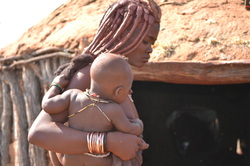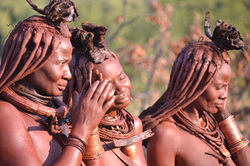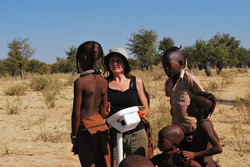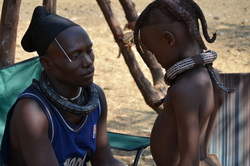
Marital and Nonmarital Fertility
The Himba have one of the highest rates of reported nonpaternity ever recorded. Both men and women engage in long- and short-term partnerships within and outside of marriage. I aim to understand how both men and women make reproductive and mating decisions within the context of these social norms and to determine whether and why particular mating strategies correlate with reproductive success.
Representative Publications
Scelza, BA. (2011) Female choice and extra-pair paternity in a traditional human population. Biology Letters 7:889-891.
Scelza, BA (2013) Choosy but not chaste: multiple mating in human females. Evolutionary Anthropology 22:259-269
Scelza, BA (2014) Jealousy in a small-scale, natural fertility population: the roles of paternity, fidelity and love in jealous response. Evolution
and Human Behavior 35:103-108.
Scelza, BA and Prall, SP. (2017) Partner preferences in the context of concurrency: what Himba want in formal and informal partners.. Evolution and Human Behavior.
Scelza et al. (2020) High rate of extrapair paternity in a human population demonstrates diversity in human reproductive strategies. Science Advances 6.8
The Himba have one of the highest rates of reported nonpaternity ever recorded. Both men and women engage in long- and short-term partnerships within and outside of marriage. I aim to understand how both men and women make reproductive and mating decisions within the context of these social norms and to determine whether and why particular mating strategies correlate with reproductive success.
Representative Publications
Scelza, BA. (2011) Female choice and extra-pair paternity in a traditional human population. Biology Letters 7:889-891.
Scelza, BA (2013) Choosy but not chaste: multiple mating in human females. Evolutionary Anthropology 22:259-269
Scelza, BA (2014) Jealousy in a small-scale, natural fertility population: the roles of paternity, fidelity and love in jealous response. Evolution
and Human Behavior 35:103-108.
Scelza, BA and Prall, SP. (2017) Partner preferences in the context of concurrency: what Himba want in formal and informal partners.. Evolution and Human Behavior.
Scelza et al. (2020) High rate of extrapair paternity in a human population demonstrates diversity in human reproductive strategies. Science Advances 6.8

Female Social Support Networks
Like most human societies, the Himba rely on extensive social support to raise their children. Within this system, I am particularly interested in understanding the relationship between mothers and their adult daughters, and learning how this pathway of support functions to improve fertility, maternal energy balance and child health. The Himba also rely extensively on fosterage and I have conceptualized this system within the larger framework of cooperative breeding.
Representative Publications:
Scelza, BA (2011) Female mobility and post-marital kin access in a patrilocal society. Human Nature 22:377-393.
Scelza, BA (2011) The place of proximity: social support in mother-adult daughter relationships. Human Nature 22:108-127.
Scelza, BA; Silk, JB (2014) Fosterage as a system of dispersed cooperative breeding: Evidence from the Himba. Human Nature 25(4): 448-464.
Scelza, BA (2015) Perceptions of Polygyny: the effects of offspring and other kin on co-wife satisfaction. Biodemography and Social Biology 61(1): 98-110.
Scelza, BA and Hinde, K. (2019) Crucial Contributions: A biocultural study of grandmothering during the perinatal period. Human Nature
Like most human societies, the Himba rely on extensive social support to raise their children. Within this system, I am particularly interested in understanding the relationship between mothers and their adult daughters, and learning how this pathway of support functions to improve fertility, maternal energy balance and child health. The Himba also rely extensively on fosterage and I have conceptualized this system within the larger framework of cooperative breeding.
Representative Publications:
Scelza, BA (2011) Female mobility and post-marital kin access in a patrilocal society. Human Nature 22:377-393.
Scelza, BA (2011) The place of proximity: social support in mother-adult daughter relationships. Human Nature 22:108-127.
Scelza, BA; Silk, JB (2014) Fosterage as a system of dispersed cooperative breeding: Evidence from the Himba. Human Nature 25(4): 448-464.
Scelza, BA (2015) Perceptions of Polygyny: the effects of offspring and other kin on co-wife satisfaction. Biodemography and Social Biology 61(1): 98-110.
Scelza, BA and Hinde, K. (2019) Crucial Contributions: A biocultural study of grandmothering during the perinatal period. Human Nature

Health and Well-Being
In conjunction with my work on social support and cooperative breeding, I am interested in understanding how variation in household demography, marital status and patterns of work affect people's health. For example, we look at the importance of the mother-daughter relationship for maternal and child health during the perinatal period. I am also involved in a collaborative project on how reproductive decisions impact sleep. In addition, I am involved in a collaboration with Katie Hinde and others to investigate the composition of and variation within women's breastmilk and to learn more about the social context in which breastfeeding takes place.. Finally, I am interested in understanding how women's mating patterns are associated with both their own health and that of their children.
Representative Publications:
Scelza, BA. (2011) The place of proximity: social support in mother-adult daughter relationships. Human Nature 22:108-127.
Scelza, BA; Silk, JB (2014) Fosterage as a system of dispersed cooperative breeding: Evidence from the Himba. Human Nature. 25(4): 448-464.
Prall, SP, Scelza BA (2017) Child fosterage and sex-biased nutritional outcomes among Namibian pastoralists. American Journal of Human Biology. DOI: 10.1002/ajhb.23058
Klein, L. et al. (2017) Concentrations of trace elements in human milk: Comparisons among women in Argentina, Namibia, Poland and the United States. PLoS One 12(8):e0183367.
Klein L. et al (2018) Variation among populations in the immune protein contribution of mother's milk reflects subsistence pattern. Evolution, Medicine and Public Health 2018.1, 230-245.
Prall et al. (2018) The influence of age and sex-specific labor demands on sleep in Namibian pastoralists. Sleep Health 4(6):500-508
Scelza, BA and Hinde, K. (2019) Crucial Contributions: A biocultural study of grandmothering during the perinatal period. Human Nature 30.4 (371-397)
In conjunction with my work on social support and cooperative breeding, I am interested in understanding how variation in household demography, marital status and patterns of work affect people's health. For example, we look at the importance of the mother-daughter relationship for maternal and child health during the perinatal period. I am also involved in a collaborative project on how reproductive decisions impact sleep. In addition, I am involved in a collaboration with Katie Hinde and others to investigate the composition of and variation within women's breastmilk and to learn more about the social context in which breastfeeding takes place.. Finally, I am interested in understanding how women's mating patterns are associated with both their own health and that of their children.
Representative Publications:
Scelza, BA. (2011) The place of proximity: social support in mother-adult daughter relationships. Human Nature 22:108-127.
Scelza, BA; Silk, JB (2014) Fosterage as a system of dispersed cooperative breeding: Evidence from the Himba. Human Nature. 25(4): 448-464.
Prall, SP, Scelza BA (2017) Child fosterage and sex-biased nutritional outcomes among Namibian pastoralists. American Journal of Human Biology. DOI: 10.1002/ajhb.23058
Klein, L. et al. (2017) Concentrations of trace elements in human milk: Comparisons among women in Argentina, Namibia, Poland and the United States. PLoS One 12(8):e0183367.
Klein L. et al (2018) Variation among populations in the immune protein contribution of mother's milk reflects subsistence pattern. Evolution, Medicine and Public Health 2018.1, 230-245.
Prall et al. (2018) The influence of age and sex-specific labor demands on sleep in Namibian pastoralists. Sleep Health 4(6):500-508
Scelza, BA and Hinde, K. (2019) Crucial Contributions: A biocultural study of grandmothering during the perinatal period. Human Nature 30.4 (371-397)

Paternity and Paternal Investment
I have a continuing interest in the role of fathers as part of the human cooperative breeding system. In particular, in my work I have emphasized the role that fathers can play in assisting their children as those children transition to adulthood. This work has been conducted with the Martu, the Himba and through collaborations with researchers working in China and India.. Currently, I am also focused on how reproductive decisions among the Himba and a high rate of paternity uncertainty affects men's investment, as well as how increased market integration and access to education are changing the way than fathers (and mothers) think about inheritance and investment.
Representative Publications:
Scelza, BA (2010) Father's presence speeds the social and reproductive careers of men. Current Anthropology 51:295-303.
Shenk, MK; Scelza, BA (2012) Paternal investment and status-related child outcomes: timing of father's death affects offspring success. Journal of Biosocial Science 44:549-569.
Mattison, S., Scelza, BA., Blumenfeld, T. (2014) Paternal investment and the positive effects of fathers among the matrilineal Mosuo of
southwest China. American Anthropologist. 116(3): 591-610.
Scelza et al. (2019) The disequilibrium of double descent. Philisophical Transactions of the Royal Society B374(1780):20180072
Scelza et al. (2019) Patterns of paternal investment predict cross-cultural variation in jealous response. Nature Human Behaviour doi:101.1038/s41562-019-0654-y
Scelza, et al. (2020) Paternity confidence and social obligations explain men's allocations to romantic partners in an experimental giving game.. Evolution and Human Behavior 41..196-103.
Prall, S. and Scelza, B.. (2020) Why men invest in non-biological offspring: paternal care and paternity confidence among Himba pastoralists. Proceedings of the Royal Society, B 287.1922
I have a continuing interest in the role of fathers as part of the human cooperative breeding system. In particular, in my work I have emphasized the role that fathers can play in assisting their children as those children transition to adulthood. This work has been conducted with the Martu, the Himba and through collaborations with researchers working in China and India.. Currently, I am also focused on how reproductive decisions among the Himba and a high rate of paternity uncertainty affects men's investment, as well as how increased market integration and access to education are changing the way than fathers (and mothers) think about inheritance and investment.
Representative Publications:
Scelza, BA (2010) Father's presence speeds the social and reproductive careers of men. Current Anthropology 51:295-303.
Shenk, MK; Scelza, BA (2012) Paternal investment and status-related child outcomes: timing of father's death affects offspring success. Journal of Biosocial Science 44:549-569.
Mattison, S., Scelza, BA., Blumenfeld, T. (2014) Paternal investment and the positive effects of fathers among the matrilineal Mosuo of
southwest China. American Anthropologist. 116(3): 591-610.
Scelza et al. (2019) The disequilibrium of double descent. Philisophical Transactions of the Royal Society B374(1780):20180072
Scelza et al. (2019) Patterns of paternal investment predict cross-cultural variation in jealous response. Nature Human Behaviour doi:101.1038/s41562-019-0654-y
Scelza, et al. (2020) Paternity confidence and social obligations explain men's allocations to romantic partners in an experimental giving game.. Evolution and Human Behavior 41..196-103.
Prall, S. and Scelza, B.. (2020) Why men invest in non-biological offspring: paternal care and paternity confidence among Himba pastoralists. Proceedings of the Royal Society, B 287.1922
I am currently recruiting PhD students to work on this project. If you are interested, please contact me at [email protected]
